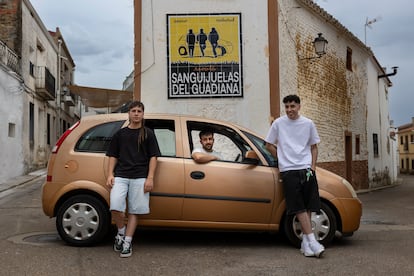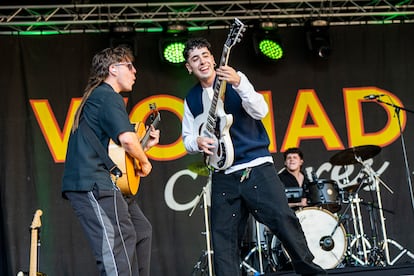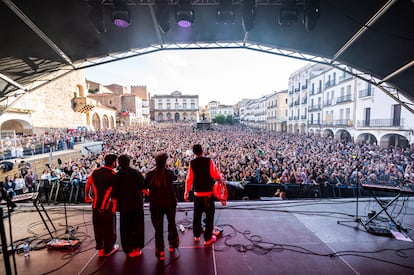Travel to Siberia in Extremadura in search of the rock band of the moment, Sanguijuelas del Guadiana

The most outrageous member of Sanguijuelas del Guadiana , Juan, is explaining the reason why he has a scar that runs across part of his forehead and disappears into a scalp from which some dreadlocks hang. His other two bandmates have heard the story a thousand times, but they can't stop laughing during the five-minute long narration. The incident is very detailed, but essentially this is what happened: parties in Talarrubias (Badajoz), all night of revelry, and it's time for the heifer. Juan, whiskey bottle in hand, sees the animal approaching and runs like hell. The heifer, lazy, stops, but he keeps accelerating, without looking back. He stumbles (you could see it coming) and ... bam! His head slams against a wooden platform placed in the square for people to climb on and avoid the animal. His head splits open. Things are serious. There's no time to take him to the nearest hospital, several kilometers away. In the plaza's infirmary, they stitched him up. 30 stitches. "I flew out and was unconscious upon impact. When they started stitching me up, I was screaming, 'Please don't shave my hair,'" he concludes, laughing.
As he gestures, a golden cross moves on the chain around his neck. Without intending to, in these five minutes Juan has captured a glimpse into the ecosystem that gave rise to the breakout group of the moment, Sanguijuelas del Guadiana: the lively festivals of the small towns and the cross they gave him on his communion day. “Because here we're all baptized, we even go through confirmation. Even if you don't want to, you go to mass every Sunday until you turn 14 because otherwise our mother will be incredibly upset. That's how the town is,” he adds, shrugging his shoulders.

It's 1:00 p.m. in one of the 10 bars ("a few years ago there were 20") in a town of 1,300 inhabitants called Casas de Don Pedro (Badajoz). The streets are scorching at 38 degrees in a scorching June. No one dares to stay outside for long: from house to bar, and back again, in search of air conditioning. Juan Grande (26 years old, guitar and keyboards), the one with the scar, was born and raised in this Extremaduran municipality; Víctor Arroba (24 years old, bass and keyboards); and Carlos Canelada (22 years old, vocals, guitar, and main composer). These three young men, at the front of Sanguijuelas del Guadiana, star in a story that goes beyond music and speaks of rural resilience and a vital, creative connection from the roots. The trio's debut album tells a chronological tale that is actually the transcendental journey of these kids from the village to the city, and back again. A journey reminiscent of that of many Spaniards after the trauma of the pandemic. But what's unique about them is that they made it in their twenties and put together a brilliant soundtrack. They're the young Spanish pop and rock group of the moment, in demand at festivals, with excellent reviews for their first album and on the way to 100 shows in 12 months. Their case is reminiscent of what Alcalá Norte experienced just a year ago.
Juan, Víctor, and Carlos are heroes today in Casas de Don Pedro, located in the so-called Siberian Extremadura region, a nickname with an origin that allows for several versions. The one offered by the group seems to be the most widely accepted: “The area has parallels with Siberia in Russia: unpopulated, with extreme weather, few resources, remote from everything, and difficult to reach by transport. We belong to the province of Badajoz, but Badajoz city is 150 kilometers away. There is only one bus that takes us there, and it stops in every town. It takes four hours to get there, almost as long as the bus that goes to Madrid.”

Revolá (released in May 2025), the title of the trio's first album, contains three parts: Jaribe, a colloquial term used in the area to describe a mischievous person, difficult to control, "like we grew up in the village: wild, free"; Barrunte, from barruntar, "when you're a teenager and you start to realize that you're going to have to leave the village to develop professionally"; De vuelta a las capitales, "the moment when you move to a big city to make a living and return every Monday after spending the weekend in the village." They have gone through this process. After the barrunte, the three decided to move to study: Víctor enrolled in Business Administration (ADE) in Cáceres, and Juan and Carlos opted for Audiovisual and Music Production in Madrid. “I lived on Avenida de América in a room that barely fit one person: tiny and with walls covered in filth,” Carlos says of his Madrid experience. “I went in thinking it was a shared apartment and I had roommates. But they rented rooms by the hour. One person came in, another left… different people every day. I think I lived in a brothel. I paid 500 euros, and for that money I have the mayor's house here [laughs]. And on top of that, they leave the fridge full.”
They admit they also enjoyed the capital, especially the nightlife. “Since the house was a mess, we were out on the street all day.” Four years later, and just when Juan and Carlos were offered a job (as technicians at RTVE), they sat down one day in a bar, talked, and made the decision . “In Madrid, renting a rehearsal space was incredibly expensive; it takes an hour to get anywhere; you get home, start playing your guitar, and the neighbor tells you off for the noise… In the village, you have peace and quiet, freedom of movement… The capital seemed like chaos and madness to us, a thousand things happening at once at high speed. It was a huge shock for three kids from a small town. The first time we were in Madrid, it was like, ‘Holy shit, what is this?’” They continue: “It was like: I’m having a great time, but other than that, what… Because we knew we wanted to make music, but we weren’t. Madrid was keeping us from being able to compose together. Emotionally, we needed to be in the village to create.”

Sanguijuelas' rehearsal space in Casas de Don Pedro is the old village discotheque, La Nota, which closed three years ago due to lack of customers. It's located right across from the church, the one they attended every Sunday until they were 14. Upon entering La Nota, a kind of cave, a thick smell of a mix of alcohol and tobacco rises. The venue is spacious, with two bars, stairs... A luxury for any band in Madrid, Barcelona, or Valencia. The trio pays only 180 euros a month. The videos for their songs were filmed in the village, with borrowed tractors and props from here and there. It's a collective effort from a rural area organized at a low price that can't be found in the city.
A key player in the trio's rise is Jorge González, a member of Vetusta Morla and head of the Infarto Records label, where the trio records. "I think we've been experiencing an identity crisis in Spanish rock since the 2000s," González recounts a few days later. "After Extremoduro, Platero y Tú, Marea... I didn't see anything. I was looking for young people who were in that vein. They gave me a demo of Sanguijuelas and I thought: 'Wow, this goes way beyond what I was looking for.'" Indeed: the Extremadura natives don't just stick to those rock references; their songs also feature touches of Estopa, Los Chunguitos, Tame Impala, Dellafuente, Daft Punk, early flamenco, mechanical electronic sounds, and autotune. "And the lyrics, which for me are almost the most important thing," notes González, who also acts as the trio's manager .
Carlos is responsible for the majority of the lyrics, in addition to singing them. He admits, with shame, that he has never read a book in his life (remember: 22 years). “I try, but I can't. They gave me Robe Iniesta's novel [El viaje íntimo de la locura] and it's probably very good, but I only made it past the first few pages. I have trouble concentrating.” Despite his limited reading experience, the lyrics Carlos writes possess a magical ability to describe scenes and situations. “The years go by quickly and haste dries up the flowers, sometimes time doesn't give us any warning, there are almost always fewer of us in the bars,” he sings in Septiembre, one of Revolá's best songs. “I listen to a lot of flamenco and base my writing on that imagery, especially the sound of the words. I'm interested in conciseness: expressing many things with one word. I look for words that take you places. A word comes to mind, and from there I imagine the situation in which I want to set the scene. I have no knowledge of writing in prose or poetry. What I feel comes out, just as it is,” he explains with aplomb.
Sanguijuelas doesn't idealize the life of a town that relies on agriculture and livestock. This is her assessment: "Winters are the worst in the world. You go out and you don't even see the cats. People who have nothing to do in the town end up badly. Apathy eats you up." Nor does the Councilor for Culture (PSOE) of Casas de Don Pedro, Celia Ponce, of a similar age (24): "It's difficult to live here, especially for young people. I myself had to go to Cáceres to study [Criminology]. I came back, and now we're trying to offer leisure and cultural opportunities to retain young people." Of the 1,300 registered residents, Ponce estimates that there will be around 300 under 30. The councilor analyzes the trio's success: "They've put the town on the map. The other day I was in Cáceres, someone asked me where I was from, and they replied: 'Wow, that's where Sanguijuelas is from.' I was in the same class as Víctor. And now look at them. On the album, they've told a story about what we young people experience in a rural environment. But not just in Casas de San Pedro: in any small town in Spain."
It's 6 p.m., and the town's sidewalks are still burning. Juan, Carlos, and Víctor are on their way to the next bar. Tomorrow is Friday, and they have to hop in the van for another weekend of concerts. The scene of the three of them walking through a terrain they know so well could have been captured in their song " La Brecha," where they say: "There's no street in town that's left untrodden."
EL PAÍS




